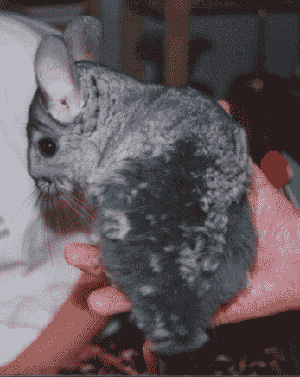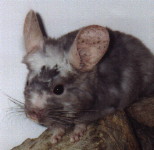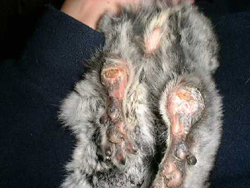Chinchilla Health
Here we'll talk about the things you're most likely to see in chinchillas and things we can do at home. Formal treatment will be up to the veternarians.
Fur Biting

Probably the most common problem seen in chinchillas in fur biting. It is estimated that 30 percent of chinchillas do this!
It looks horrible, but there no known medical consequences. Some think that it can cause blockages (hairballs) but I've never heard of this happening in a chinchilla.
This is not something to bring your chinchilla to the vet for. You can try lessening the stress (moving him to a quiet environment) or sparking his interest through free time or toys, but this trait is probably genetic and just part of their personality. It just gets worse with stress or boredom.
Knowledgeable breeders will not breed animals who do this - but we see this in a lot of pet store animals.
Fungus
 A skin fungus (ringworm) that cause bare patches of skin (hairloss). It's spread through direct contact, such as contaminated dustbaths, bedding, or humans. It usually happens around the nose or tail first, then spreads. A skin fungus (ringworm) that cause bare patches of skin (hairloss). It's spread through direct contact, such as contaminated dustbaths, bedding, or humans. It usually happens around the nose or tail first, then spreads.
An excellent reason to wash your hands before touching your animals, isn't it?
Can be treated with anti-fungal power in the dustbath (you can use athletic foot powder) for a few days, or Blue Kote spread on the skin (this stuff STAINS!). Fungus is easy to get rid of when it's not humid and the cages are kept clean.
Bumblefoot

A very painful condition in humans and chinchilllas, it when openings in the feet get infected and cause painful sores. Left untreated it can cause anemia and death.
It can be treated topically (Blue Kote), but also make sure to keep the affected chin in a non-wire cage, changing the bedding daily.
Vets can provide painkillers as well. You'll probably want to see one about this.
Malocclusion
Overgrown teeth, usually caused by lack of suitable chewing materials, but it can also be genetic. Displayed by slobbering, loss of appetite, and weight loss. Untreated, the chinchilla will die. See a vet to see if you caught it early enough for a trimming, otherwise... See a vet as soon as possible with this one.
Hair Rings
Caused to the male penis by breeding, a hair ring can encircle the penis. This is quite uncomfortable, affecting urination. Check your breeding males monthly, if not more often (it can also happen in non-breeding males, but it's not as likely). Treat by moistening area with water or petroleum jelly and working it free. Awkward, but not worth a vet visit!
Interested in finding more detailed information? You can find a great deal of information on chinchilla health at the Merck Veterinary Manual online.
We'll also add more information here as questions and new information arise.
Have a question? Let us know! |

 A skin fungus (ringworm) that cause bare patches of skin (hairloss). It's spread through direct contact, such as contaminated dustbaths, bedding, or humans. It usually happens around the nose or tail first, then spreads.
A skin fungus (ringworm) that cause bare patches of skin (hairloss). It's spread through direct contact, such as contaminated dustbaths, bedding, or humans. It usually happens around the nose or tail first, then spreads.

